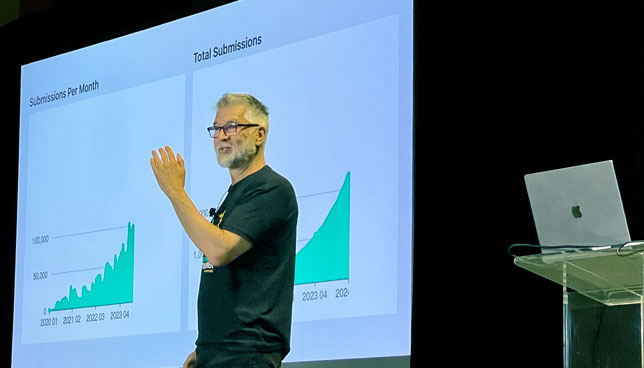ARTICLE AD BOX
From the Kuali Days 2025 Conference: A CEO's View of Planning for AI
A Conversation with Joel Dehlin
- By Mary Grush
- 04/14/25
How can a company serving higher education navigate the changes AI brings to the ed tech marketplace? What will customers expect in this dynamic? Here, CT talks with Kuali CEO Joel Dehlin, who shared his company's AI strategies in a featured plenary session, "Sneak Peek of AI in Kuali Build," at Kuali Days 2025 in Anaheim.

Joel Dehlin opening Kuali Days 2025 in Anaheim (Photo courtesy Kuali. With permission.)
Mary Grush: How did you first start thinking about AI and what it could mean for your company and ultimately for the Kuali product suite?
Joel Dehlin: AI has been around for decades, but it didn't really catch my attention until late 2022, when I stumbled across something online called the Church of the Whale. It was clearly satire — a full-blown "religion" with scripture, hymns, and clever design. What made it remarkable, though, was that it had been entirely created by AI. That was my first real introduction to ChatGPT.
Since then, I've been exploring AI tools almost daily — sometimes for work, sometimes to learn, and sometimes just out of curiosity. What amazed me most at first was just how powerful these tools are. The speed, the fluency, the unexpected creativity — AI feels like something fundamentally different from any tech wave we've seen before.
AI feels like something fundamentally different from any tech wave we've seen before.And what's been just as surprising is how slowly real engagement with AI has spread. Even now, years later, many people still haven't fully grasped how much AI will reshape the way we work, learn, and lead.
Grush: How did you begin to think about the impact AI could have on Kuali?
Dehlin: Once I realized how powerful these tools are, it became clear we couldn't just wait around. We needed to understand what AI means — not just for our own company, but for the colleges and universities we serve.
We needed to understand what AI means — not just for our own company, but for the colleges and universities we serve.Our customers face enormous complexity. They're juggling regulations, legacy systems, siloed data — and often doing so with limited resources. AI has the potential to reduce friction across all of that. But only if it's implemented with care, trust, and a deep understanding of how higher ed actually works.
That realization pushed us to rethink not just our roadmap, but the way we build products — with AI at the core, not just bolted on. It became about helping people work smarter, not simply faster.
That realization pushed us to rethink not just our roadmap, but the way we build products — with AI at the core, not just bolted on.Grush: As a CEO, what steps have you taken to help your company adapt to the changes AI is bringing?
Dehlin: Recognizing that it's still relatively early in the human/AI "relationship" — and that the common understanding of AI is often different from the reality — I wanted to create a purposeful learning experience inside our company. We needed people not just to be aware of AI, but to start using it. Actively. Intentionally.
I wanted to create a purposeful learning experience inside our company. We needed people not just to be aware of AI, but to start using it.We've made it a leadership priority to help our teams build real fluency with AI — not just to dabble. That means providing training, carving out time for experimentation, and encouraging people to learn from each other. We also made the call early on to give everyone access to the best tools — not just the free ones — because that experience really matters.
-

Congressional Task Force Releases Recommendations for AI Governance
The bipartisan House Task Force on Artificial Intelligence recently released its recommendations to bolster American leadership in AI.
-

Report Makes Business Case for Responsible AI
A new report commissioned by Microsoft and published last month by research firm IDC notes that 91% of organizations use AI tech and expect more than a 24% improvement in customer experience, business resilience, sustainability, and operational efficiency due to AI in 2024.
-

University of Florida Invests in Supercomputer Upgrade for AI, Research
The University of Florida has announced plans to upgrade its HiPerGator supercomputer with new equipment from Nvidia. The $24 million investment will fuel the institution's leadership in AI and research, according to a news announcement.
-

New Education Design Lab Initiative Convenes Five Community Colleges to Reimagine Their Future
Education Design Lab, a nonprofit devoted to designing, prototyping, and testing education-to-workforce models, has announced the inaugural cohort of its Reimagining Community Colleges Design Challenge.









 English (US) ·
English (US) ·